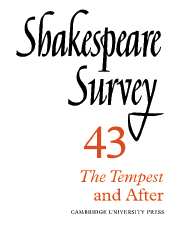Book contents
- Frontmatter
- The Power of Magic: From Endimion to The Tempest
- Reading The Tempest
- The Latter End of Prospero’s Commonwealth
- Henry VIII and the Deconstruction of History
- The Politics of Conscience in All is True (or Henry VIII)
- Shakespeare’s Romantic Innocents and the Misappropriation of the Romance Past: The Case of The Two Noble Kinsmen
- The Hand of John Fletcher in Double Falsehood
- ‘The Duke my Father’s Wrack’: The Innocence of the Restoration Tempest
- ‘Remember/First to Possess his Books’: The Appropriation of The Tempest 1700-1800
- The Tempest and After
- Poetry’s Sea-Changes: T. S. Eliot and The Tempest
- The New Function of Language in Shakespeare’s Pericles: Oath versus ‘Holy Word’
- The Discovery of The Rose Theatre: Some Implications
- The Origins of the Roxana and Messallina Illustrations
- Recycling the Early Histories: ‘The Wars of the Roses’ and ‘The Plantagenets’
- Shakespeare Production in England in 1989
- Professional Shakespeare Productions in the British Isles, January-December 1988
- The Year's Contributions to Shakespeare Studies: 1 Critical Studies
- 2 Shakespeare’s Life, Times, and Stage
- 3 Editions and Textual Studies
- Books Received
- Index
Poetry’s Sea-Changes: T. S. Eliot and The Tempest
Published online by Cambridge University Press: 28 March 2007
- Frontmatter
- The Power of Magic: From Endimion to The Tempest
- Reading The Tempest
- The Latter End of Prospero’s Commonwealth
- Henry VIII and the Deconstruction of History
- The Politics of Conscience in All is True (or Henry VIII)
- Shakespeare’s Romantic Innocents and the Misappropriation of the Romance Past: The Case of The Two Noble Kinsmen
- The Hand of John Fletcher in Double Falsehood
- ‘The Duke my Father’s Wrack’: The Innocence of the Restoration Tempest
- ‘Remember/First to Possess his Books’: The Appropriation of The Tempest 1700-1800
- The Tempest and After
- Poetry’s Sea-Changes: T. S. Eliot and The Tempest
- The New Function of Language in Shakespeare’s Pericles: Oath versus ‘Holy Word’
- The Discovery of The Rose Theatre: Some Implications
- The Origins of the Roxana and Messallina Illustrations
- Recycling the Early Histories: ‘The Wars of the Roses’ and ‘The Plantagenets’
- Shakespeare Production in England in 1989
- Professional Shakespeare Productions in the British Isles, January-December 1988
- The Year's Contributions to Shakespeare Studies: 1 Critical Studies
- 2 Shakespeare’s Life, Times, and Stage
- 3 Editions and Textual Studies
- Books Received
- Index
Summary
Full fathom five thy father lies.
Of his bones are coral made;
Those are pearls that were his eyes;
Nothing of him that doth fade
But doth suffer a sea-change
Into something rich and strange.
Sea-nymphs hourly ring his knell:
[spirits] (within) Ding dong.
Hark, now I hear them.
[spirits] (within)
Ding-dong bell.
(The Tempest 1.2.400-9)What part does poetry play, characteristically, in the mental life of its readers? I suggest that a primary function of poetry is simply to provide the reader with the memory of words, phrases, lines, images, impressions and occasionally complete poems. On the other hand it is sometimes seen as providing myths or structures for comprehending life as a whole: the Romantic poets, Blake, Wordsworth and Shelley have been seen in this way. That is to say their work as a whole has been seen as amounting to a comprehensive structure, a vast myth which comprises a view of life, or a 'philosophy' more or less (usually less) precisely formulable. It has also been seen, more recently, as a part of discourse in general, upon which ideological interpretation can get to work to disclose the workings of a particular society. This last role can, I think, be relegated to a subordinate position: something you can do with poetry after reading it and thinking about it as poetry (which is not to say that politics and ideology may not be also part of our immediate response to it as poetry).
- Type
- Chapter
- Information
- Shakespeare Survey , pp. 121 - 130Publisher: Cambridge University PressPrint publication year: 1991



